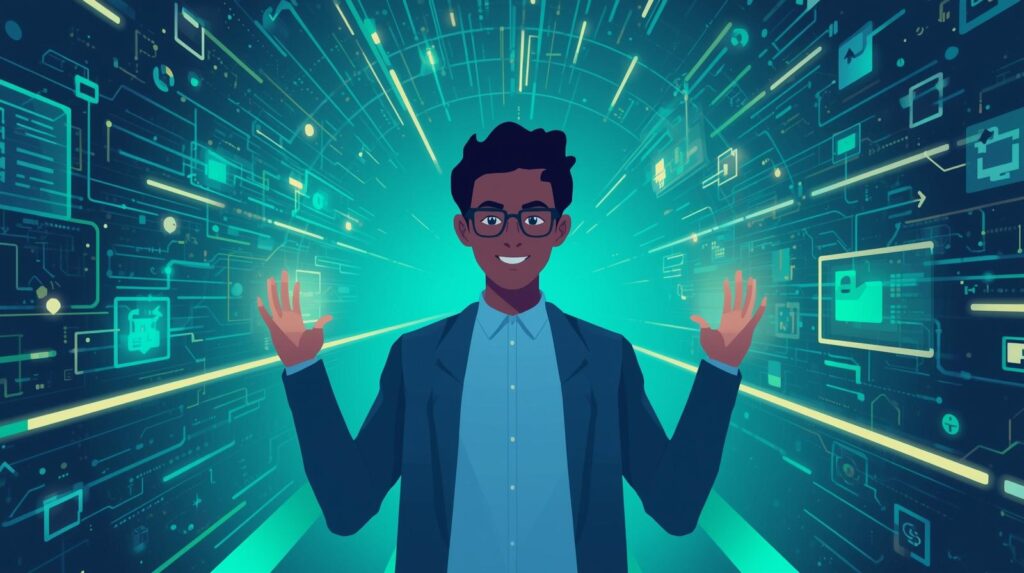You open your favorite shopping app, and before you even start typing, it suggests exactly what you were planning to buy. Feels a little uncanny, right? That’s AI in action. In 2025, artificial intelligence isn’t just a buzzword anymore—it’s reshaping digital marketing in ways that make both customers and businesses feel like mind readers. Let’s dive into how this shift is happening, backed by research and expert voices.

AI-Powered Personalization: From Automation to Hyper-Personalization
If you’ve ever wondered why online recommendations suddenly feel eerily spot on, here’s the reason: personalization has gone hyper. According to Gartner, nearly 80% of marketers believe AI has improved their ability to personalize campaigns by 2025.
BrandXR’s May 2025 report adds more proof—59% of marketing leaders are using AI for personalization, leading to some eye-opening results:
- * \~25% higher ROI
- * \~20% increase in sales
- * Double the customer engagement
- * Up to 1.7× better conversion rates
As Dr. Lisa Chen from Stanford explains AI’s ability to process massive data sets instantly makes personalization scalable. We’re no longer guessing—we’re connecting with people on their terms.
AI-Driven Content Creation and Campaign Optimization
Ever felt like brands know exactly when and what you want to read? That’s AI quietly curating your experience. HubSpot reports that marketers in 2025 are using AI to:
- Write how-to guides (40%)
- Generate blog posts and articles (40%)
- Analyze campaign data (35%)
- Brainstorm ideas (27%)
John Matthews, CMO of a leading e-commerce brand, puts it simply: AI doesn’t just help us write. It helps us understand what’s worth writing—and when our customers are ready to hear it.
Chatbots, Virtual Assistants & Predictive Analytics
Remember when chatbots felt clunky and frustrating? Those days are fading fast. A Deloitte 2025 study found AI-powered bots now resolve 70% of customer queries, often with a 90% satisfaction rate. Even Gartner predicts that by 2026, 80% of advanced marketing teams will use AI to optimize campaigns in real time.
Sarah Patel, who leads customer experience at a global SaaS company, says: *“Chatbots now feel like helpful assistants rather than barriers. They’re faster, more natural, and—let’s be honest—they save everyone a lot of time.
Building Trust: Ethical AI and Consumer Confidence
Here’s the catch: while AI grows smarter, consumer trust is still catching up. Gartner’s research shows that although businesses are enthusiastically adopting generative AI, only about 40% of consumers fully trust it.
Digital ethics consultant Maria Gonzales reminds us: Brands that prioritize transparency and fairness aren’t just checking a box. They’re building long-term credibility.
Preparing for the AI Future: Data Foundations and Readiness
Of course, AI can’t work its magic without strong data foundations. TechRadar recently reported that 78% of global firms still lack AI-ready data systems. Without unified, high-quality data, even the smartest AI tools hit roadblocks.
So what should businesses do? Experts recommend:
- Start small—experiment with one or two AI tools.
- Invest in scalable infrastructure.
- Train your teams to use AI confidently.
- Be transparent with customers about how AI is used.
Conclusion: A Human Touch in an AI-Driven World
So, is AI replacing marketers? Not at all. It’s amplifying their ability to connect, understand, and serve. Think of AI as the backstage crew making the show run smoothly while humans remain center stage. In 2025, the businesses winning customer loyalty are the ones that balance innovation with empathy, efficiency with trust.
What about you? Whether you’re a marketer or just someone scrolling through ads, you’re already living in the AI-powered marketing era. The question is: how will you use it to create better, more meaningful experiences?

Leave a Reply